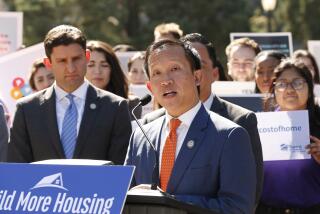U.S. Sides With Port District in Noise Suit : Court Asked to Rule Against Residents Near Lindbergh Field Seeking Damages
- Share via
Siding with the San Diego Unified Port District and against homeowners who live near Lindbergh Field, the U.S. Justice Department on Monday asked a federal judge to throw out hundreds of residents’ claims for damages resulting from airport noise.
In a friend-of-the-court brief, Justice Department attorneys argue that permitting such lawsuits would result in “a serious adverse impact on the national air transportation system” by indirectly forcing airports to curtail operations.
More than 1,200 Loma Portal residents are seeking damages of $100,000 apiece plus $100,000 for each of the 750 properties they own in 10 lawsuits pending in U.S. District Court in San Diego. Some of the property owners have said they hope the suits will force the Port District to relocate the airport.
The Justice Department brief joins the Port District in arguing for the reversal of a 1985 California Supreme Court decision that made such lawsuits viable. Before the court ruling, which involved Burbank Airport, residents near California airports had faced near-impossible hurdles to collecting damages for noise pollution.
Limit on Claims
Until then, state courts had ruled that homeowners could file only inverse condemnation suits against airport operators--suits claiming that homeowners deserved compensation for the reduction in the value of their properties stemming from airport noise. But because such claims had to be filed within five years of the start of the noise problem, operators of long-existing airports regularly prevailed over homeowners in the suits.
Such was the case in 1980, when a San Diego Superior Court judge overturned a $2-million jury verdict awarded to 180 Loma Portal residents, ruling that the statute of limitations for the suit had expired.
The 1985 ruling by the state Supreme Court gave the Loma Portal homeowners--and airport neighbors statewide--another chance. The court stripped away the five-year statute of limitations by holding that airport noise was an ongoing nuisance and that homeowners could continue to sue for personal and property damages as long as the problem persisted.
Justice Department and Port District lawyers contend that the 1985 decision set a bad precedent. Permitting people who live under flight paths to use the courts to force changes in airport operations, the lawyers say, infringes on the federal government’s power to regulate air travel.
“Only the federal government and the airport proprietor have any authority in the area of aircraft noise,” the Justice Department brief contends. It argues that residents’ only remedies should be condemnation actions--which remain governed by the five-year statute of limitations--and participation in federally sponsored noise control studies.
U.S. District Judge J. Lawrence Irving will conduct a hearing Oct. 16 on the Port District’s motion to throw out all but the residents’ inverse condemnation claims--a step that would be tantamount to a complete defeat for the homeowners.
Attorneys representing both the homeowners and the Port District said Monday they believed the San Diego case marked the first time the federal government had spoken out against the California decision allowing homeowner lawsuits over airport noise.
Michael Gatzke, a Carlsbad attorney who represents the Port District in the suits, said federal officials appeared to be concerned about widespread efforts by California airports to reduce their exposure to noise-related lawsuits by limiting airport operations.
“It has reached the point where it’s significantly limiting capacity and affecting operations,” Gatzke said.
Tougher Curfews Ordered
In San Diego, port commissioners ordered tougher curfews on late-night departures from Lindbergh Field, requiring airlines, effective Thursday, to use a new generation of quieter jets for takeoffs between 10 p.m. and 11:30 p.m. Airlines complained that the rules might force them to reduce service from San Diego, while the Federal Aviation Administration condemned the restrictions as “undesirable” and “premature.” Since 1979, flights between 11:30 p.m. and 6:30 a.m. have been prohibited.
John Schimmenti, an El Segundo attorney who represents the Loma Portal property owners, said arguments similar to those raised by the Port District and the Justice Department have been rejected by a federal judge in litigation concerning noise at Long Beach Airport.
Schimmenti scoffed at the argument that permitting such suits could wreck airport operations, noting that no harm had befallen Los Angeles International Airport after a rare victory for airport neighbors in litigation in the late 1970s.
“Obviously, we all know LAX is alive and well,” he said.
More to Read
Sign up for Essential California
The most important California stories and recommendations in your inbox every morning.
You may occasionally receive promotional content from the Los Angeles Times.













